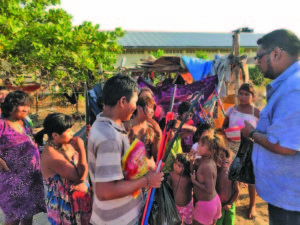…. “ without shelter, food, water” – Irfaan Ali
More than two dozen Venezuelans were recently discovered camping in the open air under very poor conditions in Lethem, Region Nine.
During a visit to Lethem last weekend, Opposition Member of Parliament, and former Government Minister Irfaan Ali, came into contact with the Venezuelans who were seeking refuge in Guyana. In a social media post, Ali said several children were among the 25 persons.
“Presently, they are living without any shelter in an open land, with no food, water or sanitary facilities. It is a sad situation, but with 25 already finding their way here, we can never be sure if any, or how much more, will also cross the border seeking shelter, food and help,” he explained.
The MP appealed to Government to urgently look into the matter, as the people of Lethem were also very concerned and the health implications could, moreover, be serious. He said there is urgent need for a national policy position on this matter, and humanitarian intervention from the state.
“I urge us as Guyanese to help if we can. It is heart-wrenching to see this level of suffering,” he expressed.

Foreign Affairs Minister Carl Greenidge had, during May last year, given full assurance that Guyana would continue to assist the people of Venezuela who continue to flee their country to escape its economic, social and political crises.
Responding to a statement made by Venezuelan Ambassador to Guyana, Reina Diaz, who had spoken about the crisis, Greenidge had pointed out: “Guyana, as a matter of routine, stands ready to assist or support all Caricom (CaribbeanCommunity) states and immediate neighbours, where appropriate (and) when asked.”
The Foreign Affairs Minister noted that the Venezuelan Government had not approached Guyana for help with its current internal crisis. However, he said Guyana stands ready to assist in spite of the difficulties that the two countries have experienced in regard to the border controversy.
Guyana had, in 2016, convened a meeting of non-governmental organisations and the private sector to consider the deteriorating conditions in Venezuela. The Venezuelan Government was, however, not open to receiving any material assistance being offered at the time.
Guyana is already providing medical assistance to many Venezuelans. It has been reported that Venezuelan nationals are crossing into Guyana, especially at Region One, to seek medical treatment for malaria. At least 368 cases of malaria were, in May 2017, reported to national health authorities in Region One, but Venezuelans seeking treatment were treated, according to Government.
Considering this to be part of Guyana’s international humanitarian contribution, Minister of State, Joseph Harmon, related that instructions were given to the Public Health Ministry to assist all comers. This assistance encompassed both Venezuelans and Guyanese who are living in the Spanish-speaking country.
There have been persistent reports that, due to a troubled economy and unrest that has gripped that nation, shortages of basic services exist in Venezuela, and those include health services. Relations between Guyana and Venezuela have worsened ever since oil giant ExxonMobil announced in 2015 that it had found oil in Guyana. Venezuela has staunchly been against oil exploration in Guyana’s Stabroek Block, where multiple oil deposits were found by ExxonMobil.
In fact, Venezuela’s National Assembly had approved an agreement to reject the oil exploration activities in March 2017. Venezuela, with almost 40 times the population of Guyana and a territory that is several times bigger, claimed, in 1968, the entire territorial sea of Guyana by means of the Leoni Decree, which has never been withdrawn. The matter is now before the Intentional Court of Justice.



